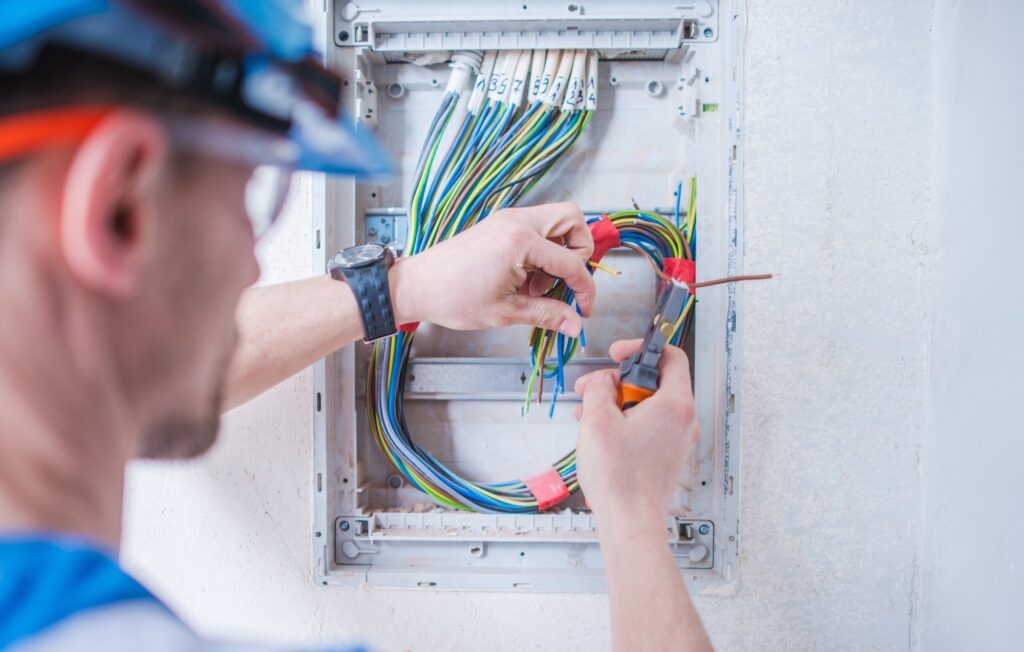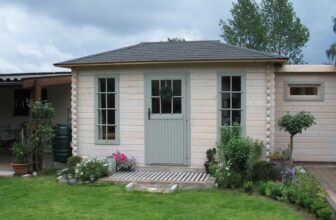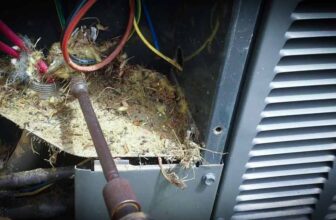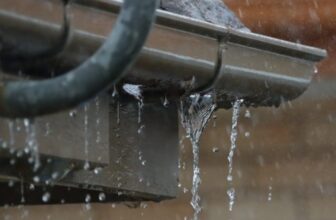
Did you know that between 2012 and 2021, the ESA reviewed 699 electrical incidents in Ontario, Canada? Electricity is incredibly useful, but mishandling it can be extremely dangerous, even more deadly.
Guaranteeing safety is important when it comes to outdoor electrical work. A professional electrical contractor always prioritizes safety, applying the same measures used indoors and taking extra precautions. Below, we’ve listed considerations to ensure the utmost safety for outdoor electrical systems.
Table of Contents
Potential Electrical Hazards in Outdoor Spaces
|
Electrical Hazard |
Description |
|
Water Exposure |
Rain, snow, sprinklers, or standing water can cause electrical shocks or short circuits. |
|
Damaged Wiring |
Exposed wires, frayed insulation, or chewed cables by animals increase the risk of electric shock or fire. |
|
Overloaded Circuits |
Plugging too many devices into outlets or extension cords can cause overheating. |
|
Inadequate Grounding |
Poor grounding increases the risk of electrical shocks, especially during lightning strikes or power surges. |
|
Improper Equipment Use |
Using indoor-rated electrical devices outdoors can pose safety hazards due to a lack of weather protection. |
|
Lack of GFCI Protection |
The absence of Ground Fault Circuit Interrupters (GFCIs) increases the risk of electric shock in wet environments. |
Being outside brings different electrical challenges and risks, so we need to understand and handle them properly. By knowing these dangers, we can take steps to keep ourselves and others safe from electrical accidents.
Always prioritize safety and take necessary precautions when working with outdoor electrical systems to mitigate these hazards.
Importance of Outdoor Electrical Safety

Source: indianaconnection.org
According to the Electrical Safety Foundation International (ESFI), about 60 people die yearly from electrical accidents. Proper safety precautions can prevent many of these accidents.
Proper Outdoor Electrical Installation
To ensure your outdoor electrical setup is safe, hire a skilled electrician to install and maintain it. They know how to deal with outdoor wiring and gear properly. Also, regularly check and look after your outdoor electrical system to quickly catch and fix any problems.
Reminder: Doing electrical installation yourself could result in risky electrical problems that endanger everyone nearby. So, hire reliable contractors that follow electrical safety rules and laws.
GFCI Protection
Ground Fault Circuit Interrupters (GFCIs) are essential for outdoor electrical safety. They detect imbalances in electrical currents and quickly cut power to prevent electric shock. GFCIs should be installed in outdoor outlets, especially those near water sources, to lower the risk of electric shocks.
Remember to:
- Install GFCIs in all outdoor outlets, like those on patios, decks, and near pools.
- Test GFCIs every month to make sure they work properly.
- Consider using combination GFCIs for both ground fault and overload protection.
Weatherproofing and Waterproofing Measures
Have outdoor outlets and covers that handle harsh weather like rain and snow. To keep your electrical connections safe, get weatherproof outlet boxes and covers. They shield against moisture, dirt, and pests.
Remember to:
- Seal outdoor outlets and junction boxes with weatherproof covers.
- Use waterproof connectors for splices and terminations.
- Install conduit for additional protection of wiring from outdoor elements.
- Check outlets often for damage and replace them if needed.
Cord Management and Protection

Source: peerlesselectronics.com
Follow these rules for safe extension cord use:
- Use outdoor-rated extension cords and power strips.
- Don’t plug in too many devices to avoid overloading cords.
- Keep cords away from high-traffic areas and water to prevent shocks.
- Make sure cords are grounded correctly. Use cord covers or bury cords underground to prevent tripping.
- Store cords indoors when not using them to keep them safe from outdoor weather.
Safe Outdoor Lighting Practices
Good outdoor lighting improves safety and security by lighting up paths, stairs, and doorways. Poor lighting outside can cause tripping and make it easier for intruders to sneak in.
- Install LED lights that save energy and meet safety standards.
- Install motion-sensor lights for better security and energy savings.
- Position lighting to avoid glare and enhance security.
- Regularly inspect and clean fixtures to maintain performance.
Check Signs of Wear, Damage, or Deterioration

Source: indiamart.com
Check the following to avoid electrical issues:
- Check outlets, plugs, and wires for cracks or breaks.
- Make sure all wires are covered and not sticking out. Exposed wires can give you a shock.
- Wiggle plugs and wires gently to see if they’re loose. Loose stuff can cause fires, so tighten or replace them.
- See if there’s any rust on the metal parts. Rust weakens stuff, so replace rusty parts to keep things safe.
- Notice if electrical stuff looks faded or discolored. This could mean they’ve gotten too hot and might not be safe.
- Look for signs of pests, like chewed wires or nests. Pest damage can mess up electrical systems.
Doing these checks regularly helps keep outdoor electricity safe and prevents accidents. If you find any issues, fix them immediately to keep everything safe.
Work With Reliable Electrical Contractors
Following these tips is a good way to stay safe with electricity. But it’s best to talk to professional electrical contractors for extra safety for you, your family, and your property. Mountain Point Electrical is here to help if you consider adding outdoor wiring to your property. Our licensed experts offer all kinds of electrical services. Contact us for inspections or installations for your next home project.
Frequently Asked Questions
How Can You Keep Outdoor Electronics Safe and Protected?
To keep outdoor electronics safe:
- Put them in a dry spot to avoid water damage. Use waterproof covers if needed.
- Don’t let them sit in the sun too long, as it can make them too hot. Put them in shaded areas or cover them up.
- Clean them to keep dust and dirt away. Use covers to protect them from getting dirty.
- Lock them up or store them in storage to protect them from thieves.
- Make sure all electrical connections are safe from the weather. Use covers for outlets and wires.
- Keep them away from water, busy areas, or things that might fall on them.
- Do what the manufacturer says to keep them working well for a long time.
Why Is It Important To Have an Emergency Plan for Outdoor Electrical Incidents?
Have a plan for outdoor electrical accidents to keep everyone safe. This plan tells you what to do if there’s an electric shock, fire, or equipment problem. Knowing the steps and who to call helps reduce injuries, stop property damage, and handle emergencies well.







